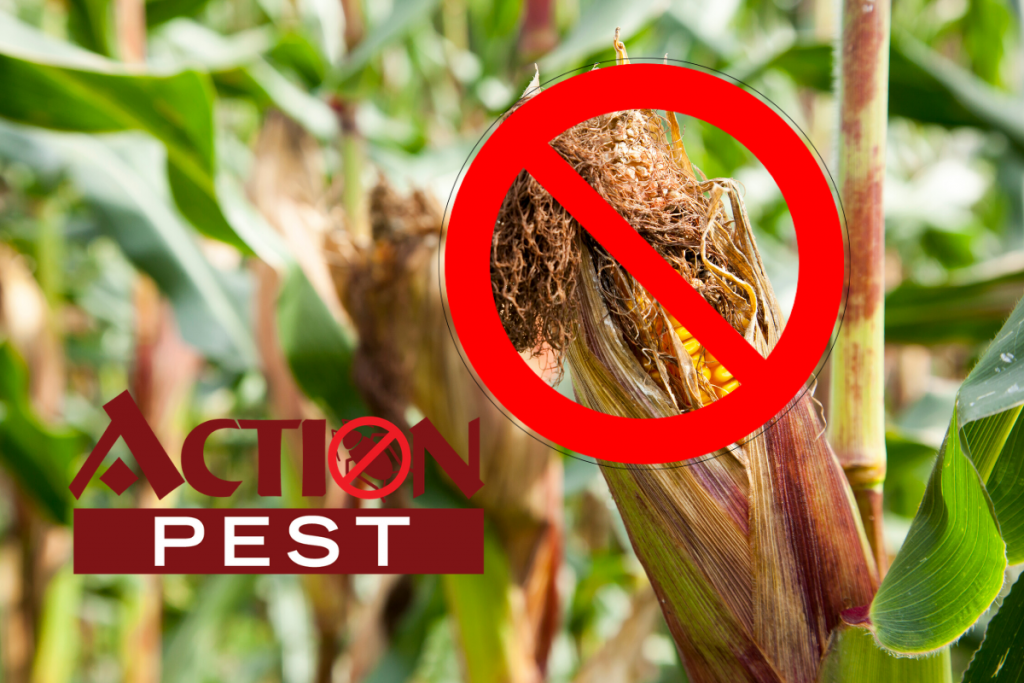
Farms are a critical part of Ontario’s supply chain, but their efforts can be threatened by pests. When that happens, not only is their livelihood impacted, but consumers are faced with a reduced supply of affordable fruits, vegetables, grains, and eggs.
Like homes and businesses, agricultural buildings like barns, silos, and processing centres have openings that let pests in. Once inside, these invaders can damage equipment, livestock, produce, and the farmer’s reputation.
In agricultural settings, the threat is not confined to structures. Out in the fields, wildlife and certain types of insects consume or damage crops like corn, potatoes, sweet potatoes, tomatoes, and peppers, ruining huge portions of that year’s harvest.
At Action Pest, we understand that agricultural pests are more than a nuisance. They can have a serious impact on your ability to support your family. In this blog, we’ll review the top three types of pest found in agricultural settings, share some tips for controlling their entry, and explain how a professional pest control company can help you protect your crops, animals, and buildings.
What are the most common agricultural pests?
From rats and racoons to squash bugs and tomato hornworms, there are animals and bugs that are out to consume your produce before it can reach the market. In general, these pests fall into one of three categories: wildlife, birds, and bugs.
Wildlife
That story about the fox in the henhouse is more than a cute parable- it really does happen, and farmers across Ontario lose eggs and chickens on a regular basis.
Rats and mice are another major pest that can cause as much havoc in rural settings as they do in cities. They eat grain, vegetables, and fruit, damage farm buildings and equipment and can even create a fire hazard due to their propensity to chew through electrical wires and cables.
Regarding crop damage, a Purdue University survey found that white-tailed deer and raccoons accounted for 95% of the damage done in the crops surveyed. The remaining damage was inflicted by crows, groundhogs, squirrels, and other species.
Birds
Birds have been damaging horticultural crops since the first crops were planted, which is why scarecrows were conceived and used. According to a report by the Ministry of Agriculture, Food, and Rural Affairs, if a single starling eats only foru grapes per day, a flock of 5,000 will consume a ton of food over 10 days. Birds tend to prefer sweeter foods, like corn and fruit, and can be difficult to repel once they hone in on a food source.
Bugs
Bugs are a given on any farm. While some are beneficial, others, like flies, contaminate both harvested and unharvested crops, and can spread diseases to livestock like cattle. Beetles and weevils can infest your harvested grain while squash bugs damage squash, pumpkins, zucchinis and cucumbers and tomato hornworms consume tomato, eggplant, pepper and potato plants.
Preventative methods in agricultural pest control
There are DIY measures that farmers can take to protect their crops and livestock from infestations. They include:
- Conserving and cultivating agricultural landscapes so that they sustain the natural enemies of many pests. Wildflower strips, hedgerow, and grassy areas along field margins can all house ladybugs and other insects that feed on pests.
- Non-volatile baits like boric acid, which are a low risk to human health.
- Eliminating cracks and crevices in areas where food is handled and stored.
- Keeping doors and windows screened and shut when not in use.
- Emptying garbage containers once per day in an area away from the facility and keeping all containers sealed between disposals.
- Regular cleaning in food processing areas. An unattended spill can attract pests in minutes.
- Placing rodent traps in dark areas, behind objects, and against the walls.
- Installing high-voltage light traps to electrocute insects.
- Applying secure screens to henhouses and other animal shelters
How an agricultural pest control company can help
Despite your best efforts, pests can and do find ways to get around your defenses and jeopardize your crops and animals. If this happens, contact an experienced pest control company that uses pesticides specially formulated for use in areas where food is handled, produced, packaged and stored.Action Pest provides farms and agricultural facilities of all sizes with competent, efficient, and effective pest control services. We utilize integrated pest management solutions that control infestations on your property while using the least amount of chemicals possible. To learn more about how we can help you, please contact us today!






